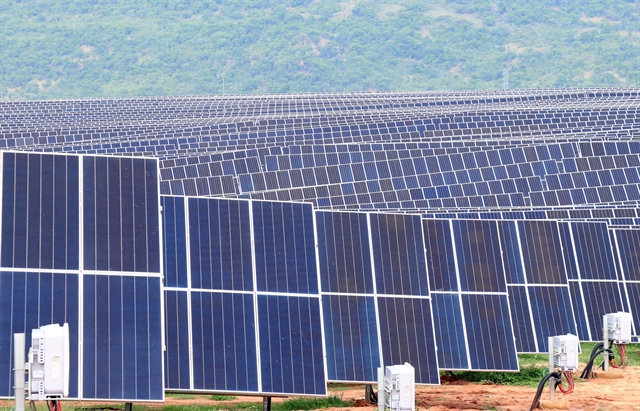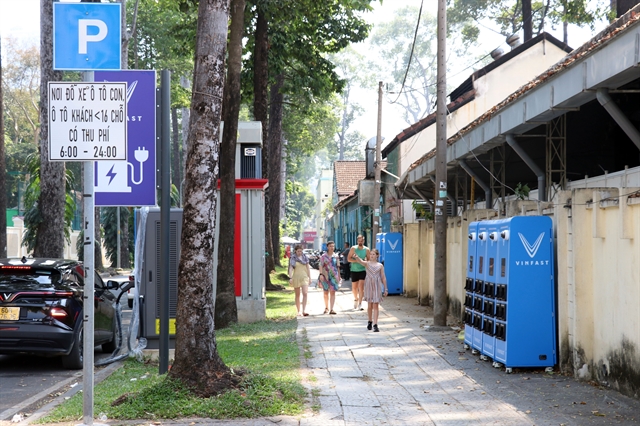.jfif) Opinion
Opinion


|
| A solar energy project in central Ninh Thuận Province. Việt Nam has gained positive renewable energy policy developments. — VNA/VNS Photo |
EU Ambassadors to Việt Nam*
Last Saturday, on the day that marked the fifth anniversary of the Paris Agreement, a number of world leaders came together to celebrate and recognise the resolve of so many in working towards a safer, more resilient climate neutral world. A world we can be proud to leave to our grandchildren.
During the past five years, the determination of the international community has certainly been tested and our global community has been hit by a virus which has had long-lasting seismic impacts on our society and economies.
In the midst of the pandemic, is it realistic to call for stronger global action to fight against climate change? And why is all this relevant for Việt Nam? We say the case is now more pertinent than ever. Looking at the droughts and devastating swarms of locusts in Africa, massive fires in Australia, infrastructure collapsing in Siberia as permafrost melts, intense hurricanes in America and typhoons in Asia, with particularly dramatic effects in the central part of Việt Nam, a more pertinent question might be: Can we afford to let things worsen?
Even before the pandemic, the European Union committed to leading a green transition. Back in December 2019, the European Commission launched the European Green Deal, a new growth model and roadmap to achieve climate neutrality in the EU by 2050. Now, a year later, we are aligning our policies in areas ranging from energy to industry, farming, food, or biodiversity with our sustainability goals.
This is now the EU’s action plan for recovery from the pandemic. Our “Next Generation EU” recovery financial package and our next long-term budget earmark more than half a trillion euros to address climate change.
The science is irrefutable. For future prosperity, we must move beyond the harmful carbon economy and invest in greening the global economy. We cannot afford not to.
To reach climate neutrality by 2050, this past Friday, December 11, EU leaders unanimously agreed on our 2030 target of reducing greenhouse gas emissions by at least 55 per cent compared to 1990 levels. It will provide predictability for our businesses, industry and citizen. It will further accelerate the fast decrease in the costs of low carbon technologies, for example, the cost of solar photovoltaics declined by 82 per cent between 2010 and 2019. Achieving the 55 per cent target will even help us to save 100 billion euros in the next decade and up to 3 trillion euros by 2050.
We know our good intentions for a green recovery in Europe won’t suffice if we fail to convince others to join us. Not only must we in Europe press ahead with our own ambitious plans for a green transition, but bring international partners on board too.
No government can tackle climate change alone. This is why we will pursue all avenues of co-operation and diplomacy through instruments such as strategic partnership agreements, trade policy, development assistance and other external financing tools. We need a virtuous circle for ambition and we need good partners. Việt Nam has definitely the potential to be one of those.
The Government of Việt Nam has actually already submitted its updated Nationally Determined Contribution to the UNFCCC in July 2020 projecting an increase of ambition to reach a reduction of 9 per cent of emissions unconditionally (up to 27 per cent with international aid) in 2030 compared to business as usual, taking 2014 as the baseline year. We welcome this important step and now with the inclusion of industrial processes into the mitigation equation.
And yet Việt Nam has much more potential to be a climate champion and a leader in the region. The recent positive renewable energy policy developments, on solar and wind power production, are an example. The potential regarding renewable energy expansion is still vast and could replace fossil-based energies on a very large scale. Other areas with major mitigation potential, and linked with increased energy efficiency, include industry, construction and buildings, agriculture and forestry, waste management and mobility. Việt Nam's investment in green growth could yield future great economic and social benefits.
Already, the ranks of the “climate neutrality club” are growing. Japan has joined the EU and has adopted the 2050 climate neutrality goal, and others aim to achieve climate neutrality around mid-century (South Africa, South Korea and China), with important details to be further clarified. Canada announced a new law on climate neutrality and president-elect Biden has indicated that the US will move in the same direction.
There is finally a sense of a global momentum emerging towards keeping the promise of the Paris Agreement and securing our future on this planet. Climate neutrality is becoming the new normal mid-century outlook for countries with very different historical and geographical circumstances.
Together with the delivery of the US$100 billion of climate financing to developing countries, these must be the deliverables for the climate negotiations when they resume at COP26 in Glasgow next November.
We can avoid the most dramatic impacts of climate change on our societies. Our global, regional, national, local and individual recovery plans are an opportunity to ‘build back better’. We owe it to next generation: major victims of social and economic consequences of the pandemic, they will have to bear the burden of climate change and pay off the debt of the recovery. And this is all very relevant for Việt Nam, currently one the 10 most vulnerable countries to climate change.
Việt Nam and its approach to climate adaptation, especially in the Mekong Delta, will feature prominently at the Climate Adaptation Summit in January 2021 that focusses on the prevention of climate-related disasters in the future. The summit aims to mobilise international finance for adaptation action plans.
These last years, the EU continued to lead the fight against climate change, but five years after the signing of the Paris Agreement, it is more important than ever that we all come forward with clear strategies for climate neutrality and enhance our level of ambition for 2030. And we stand ready to continue to assist Việt Nam in doing so.
The COVID-19 pandemic has made us aware that good public policies alone are not enough. We will also need to foster small individual actions to attain a big collective impact. This is the snowball effect we need starting from the Paris Agreement. With climate neutrality as the direction of travel, the world can mobilise its best engineers, businesspeople, policymakers, artists, academics, NGOs and citizens to protect together something we all share beyond borders and species: our planet. — VNS
* This op-ed is co-signed by all EU Ambassadors resident in Việt Nam: Mr Giorgio Aliberti - Ambassador of EU Delegation, Mr Paul Jansen – Ambassador of Belgium, Mrs Marinela Petkova – Ambassador of Bulgaria, Dr Vitezslav Grepl – Ambassador of Czechia, Mr Kim Hojlund Christensen – Ambassador of Denmark, Dr Guido Hildner – Ambassador of Germany, Mr John McCullagh – Ambassador of Ireland, Mr Georgios Stilianopoulos – Ambassador of Greece, Ms Maria Pilar Mendez Jimenez – Ambassador of Spain, Mr Nicolas Warnery – Ambassador of France, Mr Antonio Alessandro – Ambassador of Italia, Mr Csaba Ory – Ambassador of Hungary, Mrs Elsbeth Akkerman – Ambassador of the Netherlands, Mr Thomas Schuller-Gotzburg – Ambassador of Austria, Mr Wojciech Gerwel – Ambassador of Poland, Mrs Mihaela Rutjens - Charge d'Affaires a.i of Romania, Mr Pavol Svetik – Ambassador of Slovakia, Mr Kari Kahiluoto – Ambassador of Finland, Mrs Ann Mawe – Ambassador of Sweden.




